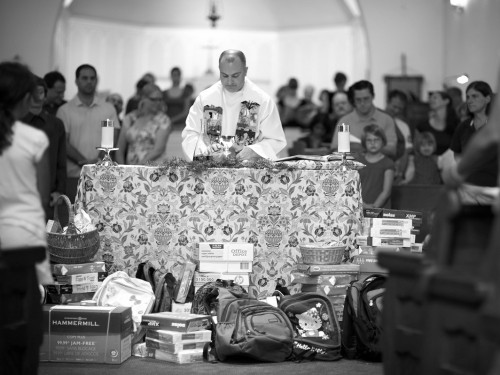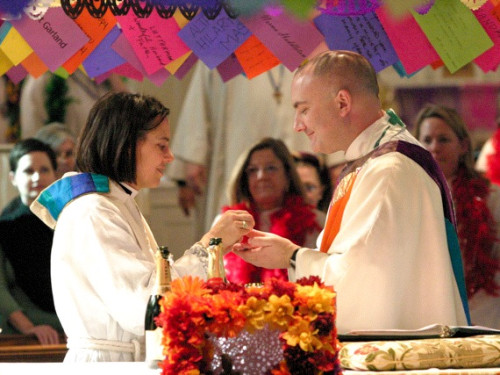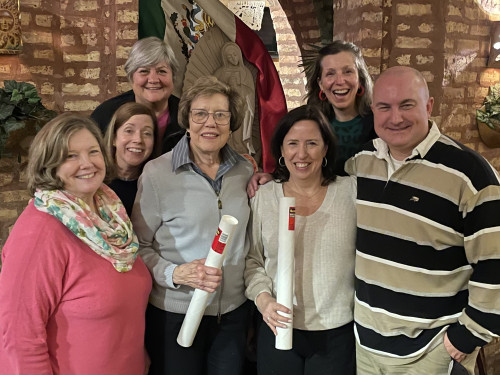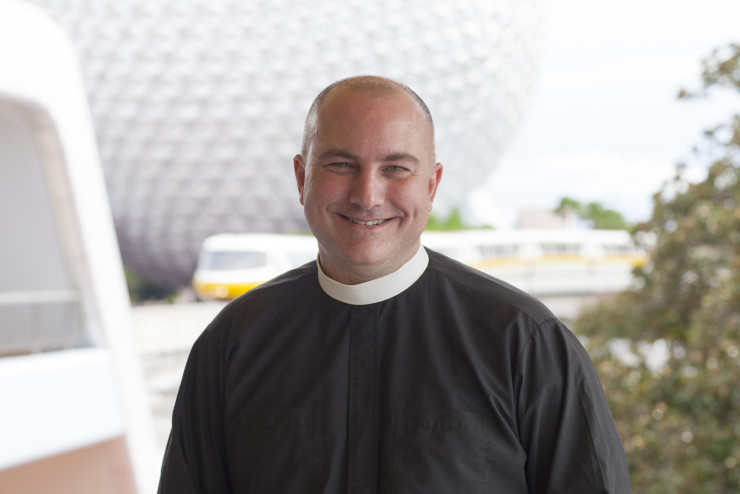“I never imagined that someday I would be serving as the executive director of EfM,” Goodman says, his voice edged with wonder. “I love EfM, and I live it. I can’t imagine my life without it. It has formed me in community. I can run a vestry meeting because of EfM. I can preach because of EfM. I can address conflict because of EfM.”
Goodman was nine years old the first time he encountered Education for Ministry. In the late ’70s the Rev. Bill Morris launched one of the first EfM groups through Goodman’s home church, All Saints’ Episcopal Church in River Ridge, Louisiana. Goodman’s mother was a participant in the first group. She brought the young Goodman to an annual EfM Family Night where people shared their growth and insights. That evening, Goodman was awed by the participants’ openness to questions and still is today—40 years later.
Goodman went on to earn a bachelor's degree at Loyola University New Orleans, graduating with a major in television production and a minor in Asian studies. He taught at Loyola as a part-time instructor while producing documentaries, commercials, instructional videos, and community-access programs—but the call to ministry and particularly to EfM remained.
In 1989, the Rev. Susan Gaumer, T’93, a member of the original EfM group at All Saints’ River Ridge, returned from seminary at the School of Theology in Sewanee. She started a new EfM group and invited Goodman to join. When she was called to another church the following year, the EfM group selected Goodman—just 21 years old at the time— to replace Gaumer as the group mentor. This meant attending EfM mentor training in Sewanee, “which, thankfully, went well,” chuckles Goodman. He mentored the group for another 12 years before following his own call to seminary in 2001.

Goodman overseeing A school supply Drive while Serving at All Saints' Ravenswood in Chicago
After graduating in 2004 from General Seminary, Goodman was ordained in the Diocese of Chicago. His first call was to work as a street pastor with The Night Ministry, a nonprofit organization serving homeless youth. Goodman later served at All Saints’ Ravenswood in Chicago with rector Bonnie Perry, who is now bishop of the Diocese of Michigan. As curate, he served as executive director of Ravenswood Community Services, the church’s nonprofit established to serve homeless and hungry neighbors. Throughout, Goodman continually served as an EfM mentor and ultimately was invited to become a trainer.

Goodman Celebrating All Saints' Day with the Rt. Rev. Bonnie Perry
“EfM keeps me honest as a layperson and as a priest. It holds me to the ordination promise to continue to study Scripture—and not just once a week to prepare a sermon. Under Karen Meridith’s leadership as executive director, with the introduction of the textbook structure and the interlude books, I’ve been able to stay current on theology.”
“This is my dream job,” he says. “And it is with fear and trembling that I step into this position. I love the program so much, and I am aware of the challenges we face.” Goodman says these are not just post-Covid challenges, but also a response to shifts in American life since EfM was founded nearly half a century ago. Today, most adults are working one job or more. People also relocate frequently and the demands on our time are greater than ever. Commitment to a four-year program—or even one year of the program—is becoming increasingly more daunting.
Goodman credits Meridith with positioning EfM to face these challenges with the development of “Deep Questions with Education for Ministry,” a series of shorter, more accessible courses. Each course poses a single question for deep-dive theological reflection in a small group setting. The courses are hybrid—meaning they may combine both virtual and in-person elements—and take an average of four to six weeks to complete. The first course, scheduled for release this summer, poses the question “What does love have to do with law?” While the Deep Question courses will not replace the four-year program, they will allow for EfM-style theological reflection in small intentional communities.

Goodman in 2022 At EfM Graduation
Goodman expands on the power of a small group setting by likening EfM to the original structure of the church: Christians meeting in small groups for faith formation. Further, Goodman anticipates the church of the future will return to this ancient model and believes EfM is well-positioned to lead the way forward. “We know how to do small-group faith formation and how to build trusting, faithful communities trying to make the heart and hands of Jesus present in the world.”
“I view EfM as modern monasticism,” he continues. “With EfM, a small group of people agree to hold one another accountable. We establish norms. We create a covenant. We decide together how we can be safe together and how we are going to honor and encounter God together. EfM tells me that my experiences of God matter—but they only make sense in the context of community.”
Goodman is excited to continue building on Meridith’s work, and the first order of business is to listen—to participants, mentors, trainers, staff, and alumni. Understanding that change will be necessary in order to remain relevant, and Goodman is counting on the EfM community to transform the program together. “I am going to begin by listening,” he says.
A major opportunity for talking and listening will take place at the 2023 EfM Summer Conference, scheduled for June 20-23 in Sewanee. The conference welcomes all current and former EfM participants, including mentors, trainers, coordinators, and alumni. Conference highlights include keynote speaker Termaine Hicks, training for experienced mentors, informational and visionary sessions, and a festive banquet to honor Meridith’s legacy and introduce Goodman. “I’m very excited that we have the opportunity to gather in person to celebrate Karen and make plans for the future together.”
By Jeannie Babb, T'12, T'13




